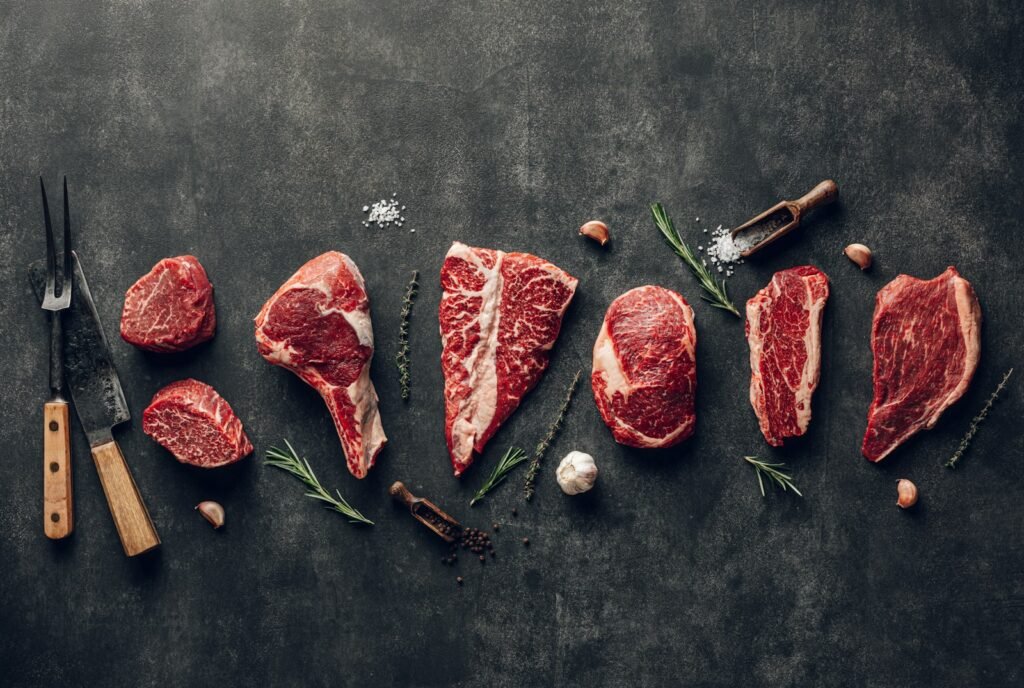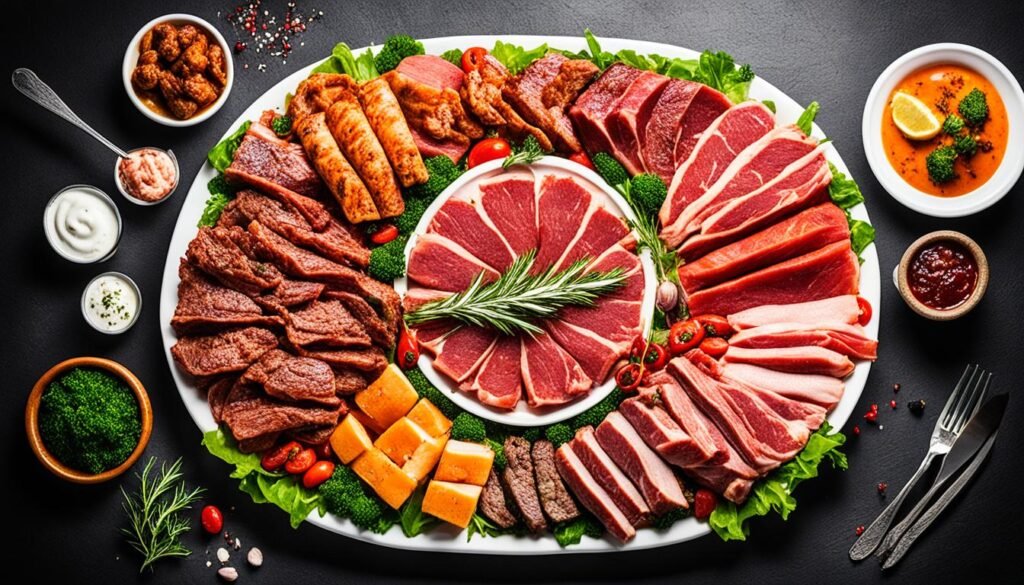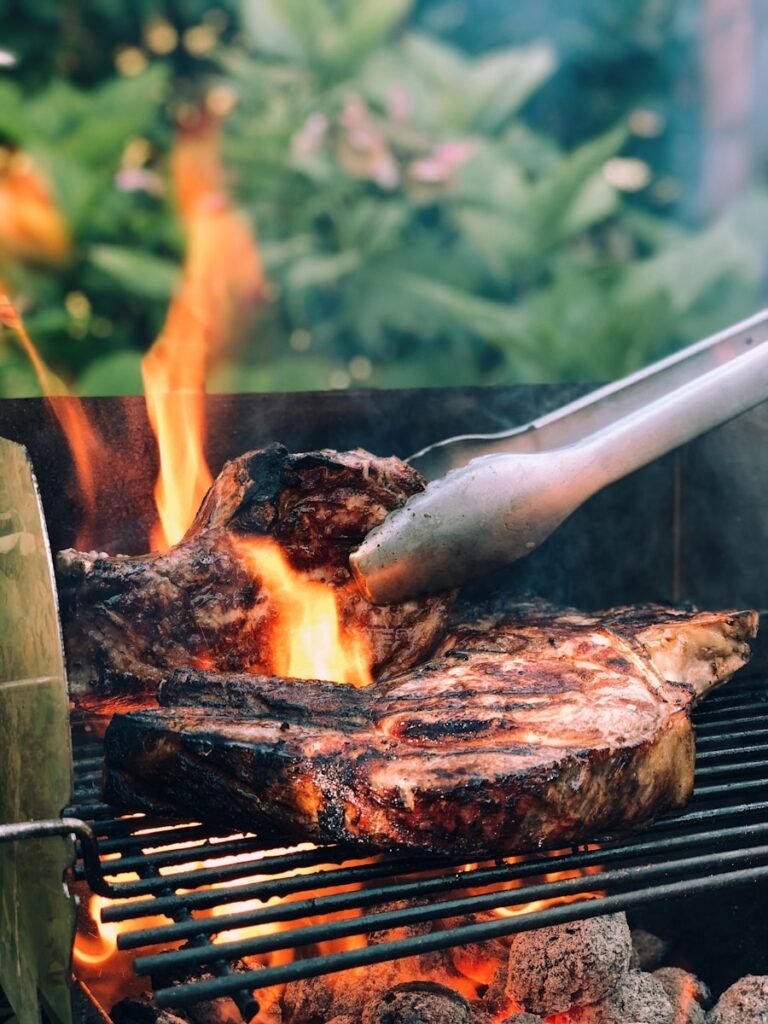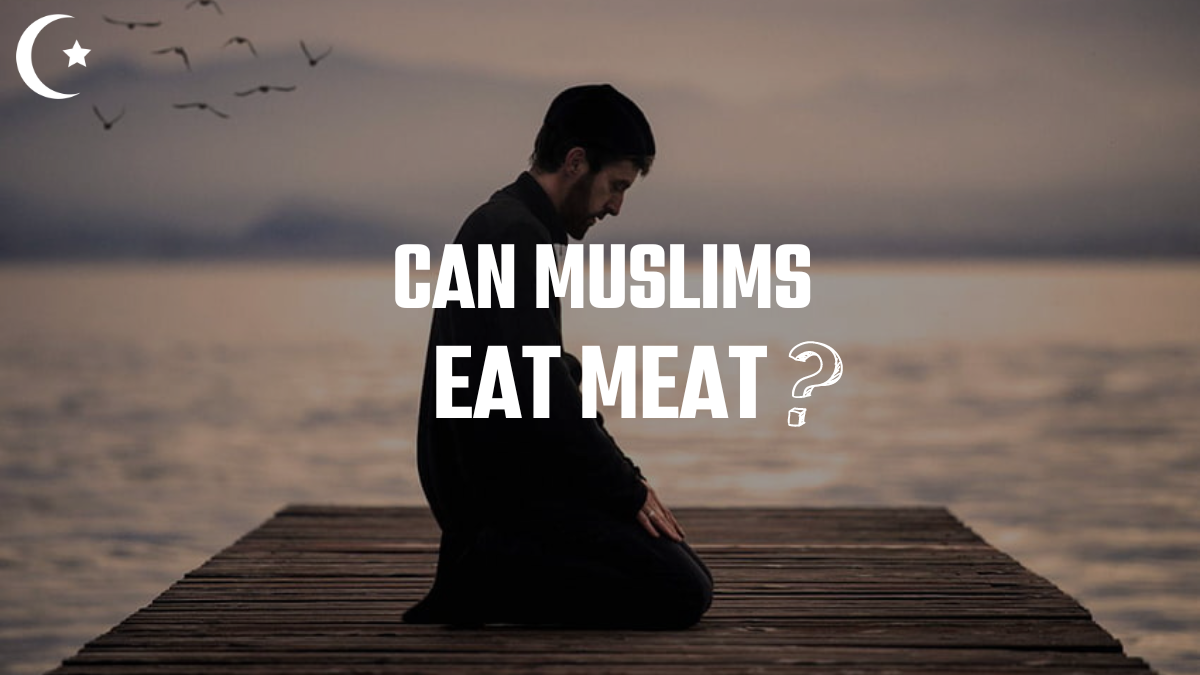Are Muslims caught between tradition and modern social events when it comes to meat? Can Muslims Eat Meat? It’s important to understand how Islamic dietary laws fit into today’s diverse world. The rules for halal meat are clear, based on the Qur’an and Hadith. They tell us what is okay to eat and what is not.
This article will look into the rules for Muslim meat consumption. We’ll see how these rules help Muslims stay true to their beliefs in different social situations.

Understanding Halal and Haram in Islam
In Islamic dietary rules, knowing what is halal and haram is key. Halal means allowed, and haram means forbidden. These terms guide Muslims in what foods and drinks they can have.
Definition of Halal
Halal means lawful or permitted in Islamic law. It covers food, drinks, and ethical actions. Foods must follow the Qur’an and Islamic teachings to be halal. This ensures they are good for both body and soul.
Definition of Haram
Haram means forbidden or unlawful. It includes things like alcohol and pork. Foods that go against Islamic values are also haram. Muslims must follow halal dietary rules to keep their spiritual life pure.
What Makes Meat Halal?
For Muslims, knowing what makes meat halal is key. The rules for halal meat cover which animals are okay to eat and how they should be killed. These rules make sure the meat follows Islamic law.
Permissible Animals for Consumption
In Islam, some animals are okay to eat. This includes herb-eating animals like cows, sheep, and goats, and birds like chickens. These animals must be raised and killed in a way that follows Islamic rules. This means they are treated kindly and humanely.
The Importance of Dhabihah (Islamic Slaughter)
Dhabihah is a key part of making meat halal. It’s a special way of killing animals that includes cutting their throat quickly while saying the name of Allah. This method aims to reduce pain and make sure all the blood is drained out. It makes the meat clean and safe to eat.
This method is good for the animals and is also healthier. That’s why many people choose halal meat.
Can Muslims Eat Meat from Various Animals?
It’s important for Muslims to know which meats they can eat. Some animals are okay to eat, while others are not. This rule helps follow animal consumption laws and keeps halal practices true to Islam.
Permitted Meats: Lamb, Beef, Chicken, and Goat
Muslims can eat meats like lamb, beef, chicken, and goat. These meats must come from animals that are healthy and treated right. When prepared in a certain way, these meats follow Islamic rules of compassion and respect.
Forbidden Animals: Carnivores and Scavengers
Some animals are not allowed for Muslims to eat. This includes lions, tigers, birds of prey, and scavengers. These rules come from animal consumption laws and stress the need for kind treatment of animals. They show a deep respect for all living beings.

Health Benefits of Halal Meat
More people are choosing halal meat for its health perks. They like it because it’s healthier and supports animal welfare.
Diet and Health Considerations
Halal meat is known for its clean preparation. It’s drained of blood completely, which lowers the risk of getting sick from it. This makes it healthier and cleaner.
People also like that halal meat doesn’t come from animals given growth hormones or antibiotics. This makes the meat seem more natural and healthy.
Animal Welfare in Halal Practices
Halal practices focus on treating animals right. Animals live in natural settings, and their slaughter is done to reduce pain. This approach meets religious standards and appeals to those who care about kind farming.
Knowing the benefits of halal meat means understanding how animals are treated well. This makes halal meat more appealing to those who value ethics in food.
Halal meat fits with ethical eating, drawing in those who care about health and animal welfare. Its popularity is rising, making it a key part of diets globally. For more on why halal meat is good, check out this resource.
Common Misconceptions About Halal Meat
There are many myths about halal meat that need to be cleared up. These myths come from not knowing much about halal and kosher diets. They also come from not understanding how animals are slaughtered for halal meat.
Halal vs. Kosher: What’s the Difference?
Halal and kosher diets have strict rules but come from different religions. Halal rules come from Islamic law and focus on treating animals well during slaughter. Kosher rules come from Jewish law and have their own set of dietary laws.
This difference often causes confusion. People get mixed up about what makes halal meat different from kosher meat.
Misunderstandings About Slaughtering Practices
There are many wrong ideas about how animals are slaughtered for halal meat. Some think it’s cruel, but it’s actually focused on making the animal feel little pain. The method used is called dhabihah and is designed to be quick and kind.
These wrong ideas can make it hard for people to see how halal meat is made ethically.
What Should Muslims Avoid When Choosing Meat?
Choosing halal meat means looking closely at food ingredients and knowing Islamic dietary laws. It’s important to avoid things like gelatin and intoxicants. Muslims must be careful with their food choices to follow their religious beliefs.
Understanding Gelatin in Foods
Gelatin often comes from pigs or non-halal beef, so it’s not allowed in the Islamic diet. Products like gummies, marshmallows, and some desserts may have this forbidden ingredient. That’s why it’s key to read labels carefully. Knowing where gelatin comes from helps avoid eating things that are not halal.
Intoxicants and Their Prohibitions
Intoxicants, like alcohol, are big no-nos for Muslims. This rule isn’t just for drinks; it also covers foods with alcohol or other intoxicants. It’s important to know if foods might have these substances. Being careful helps follow halal dietary laws and live a halal lifestyle.

Exploring Halal Meat Options in the United States
Halal meat options are becoming more popular in the United States. This is because more Muslims live here and people like trying new foods. Now, many look for halal-certified meat for health and personal beliefs. There are many places to buy halal meat and eat at halal restaurants.
Where to Find Halal Certified Meat
In the U.S., finding halal-certified meat is getting easier. Big stores like Costco, Safeway, and Target now carry halal meat. This makes it easier for people to get what they need. Specialty stores like Sahara Market focus only on halal products, offering a wide selection.
Popular Halal Restaurants Across America
Halal restaurants are popping up all over America, changing the way we eat. Places like The Kebab Shop and Masala Pizza offer a variety of foods. They’re not just for Muslims but also for anyone who loves the taste and quality of halal meat. This shows how more people are embracing halal dining.
Can Muslims Eat Meat During Special Occasions?
Special occasions in Islam bring people together, with food being a big part of it. Halal meat is key for Muslims to follow their diet during these times. Eid al-Adha is a big event where eating halal meat is a big deal.
Meat Consumption during Eid al-Adha
Eid al-Adha, or the Festival of Sacrifice, is very important for Muslims. People are told to sacrifice animals like sheep, goats, or cows. This act makes halal meat a big part of the celebration and shows faith.
It lets families share the meat with others, like relatives and those in need. This shows how halal meat is important for kindness and giving.
Community and Family Gatherings Involving Halal Meat
Family gatherings often have halal meat dishes that bring people closer. These meals are important for sharing and following halal rules. People look for places that serve halal meat to feel at ease.
These events also offer many halal choices, like seafood and vegetarian dishes. This makes sure everyone can enjoy the meal. Having halal options makes family gatherings special and unforgettable.
Can Muslims Eat Meat? A Summary of Guidelines
For Muslims, knowing what foods are halal is key. Most foods are halal, but some are haram. Islamic teachings say about 20 items are forbidden, like pork and alcohol. Foods like lamb, beef, and chicken are usually okay.
It’s crucial to pick meats carefully to follow halal dietary rules. The way animals are slaughtered is also important. The Zabihah method ensures the meat is clean and pure.
While it’s best to eat halal, there are exceptions. Muslims can eat some foods from the People of the Book if they follow certain rules. It’s important to look for halal certification to be sure the food meets Islamic standards.
So, can Muslims eat meat? The answer lies in understanding halal dietary laws. By choosing halal products, Muslims can follow their beliefs. This not only respects their faith but also supports health and ethical eating habits.
FAQ
What does halal mean?
What are the primary forbidden foods in Islam?
Which types of animals can Muslims eat?
What is the significance of the dhabihah slaughter method?
Are there any health benefits associated with halal meat?
How does halal meat differ from kosher meat?
What should Muslims be cautious about regarding food ingredients?
Where can Muslims find halal certified meat in the United States?
Can Muslims eat meat during Eid al-Adha?
Why is animal welfare important in halal practices?

Embracing Faith, One Insight at a Time!
The teachings of the Quran have always guided my path. With a deep passion for Islamic knowledge, I strive to blend the wisdom of tradition with the relevance of today, making the timeless messages of Islam accessible and meaningful for everyone.
Muslim Culture Hub is my platform to share historical insights and thought-provoking articles, exploring both well-known and lesser-discussed aspects of Islamic culture and beliefs. My mission is to create an inclusive online space where everyone can learn, strengthen their faith, and connect with the profound message of Islam.
Join the journey!
May peace be upon you.








